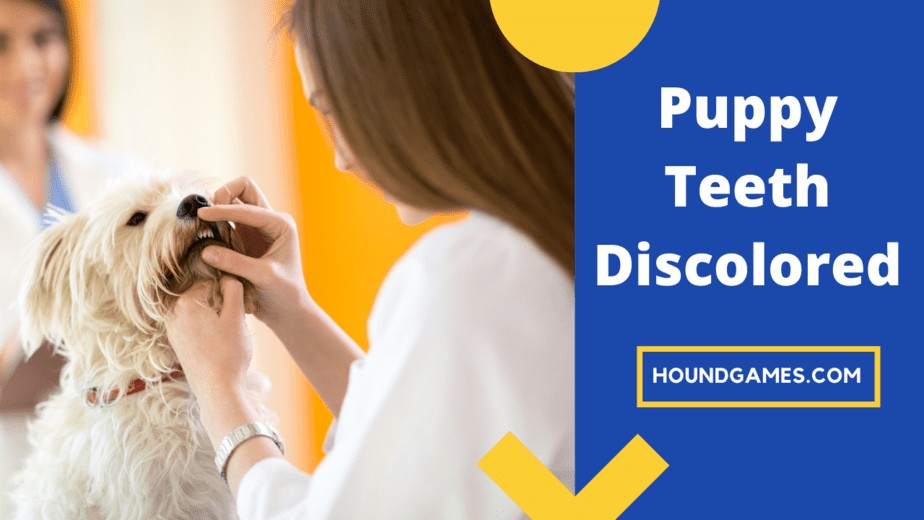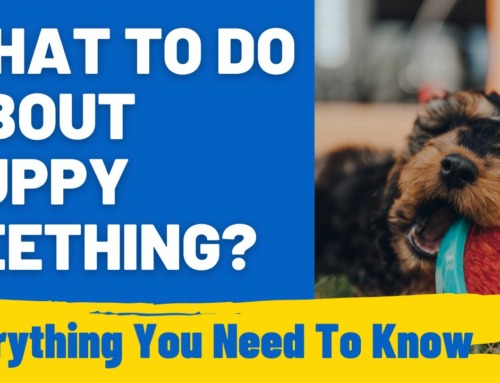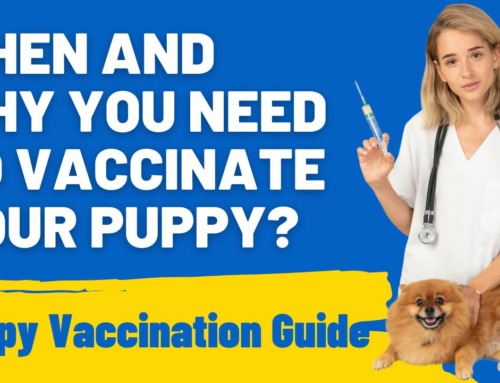Are your puppy’s teeth turning a dark color or discolored? This may be normal aging of the tooth as your puppy is about to lose their baby teeth. This may also be that your puppy has something wrong with this tooth and needs to see your vet. These are some of the common reasons that a puppy’s teeth turn different colors and what you need to do about it.
Colors of puppy teeth
There are many different colors that your puppy’s teeth could be. Normally, your puppy’s teeth should be white in color. The part of the tooth that is close to the gum line will have a pinkish color to them.
As your dog gets older, you may notice plaque and tartar build-up on your puppy’s teeth. This would cause your dog’s teeth to turn yellow or brown. This usually is not seen until your dog is at least 1 year old.
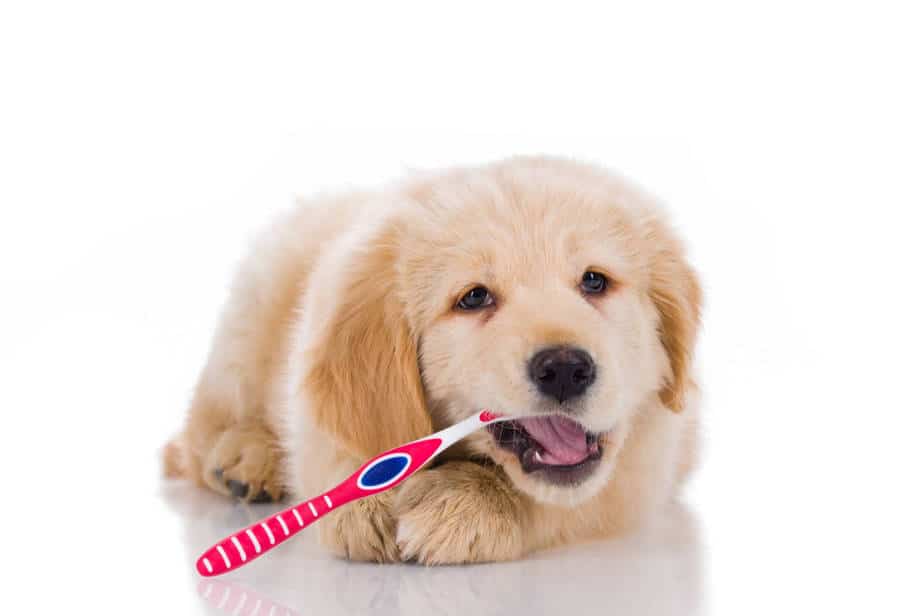
My puppy’s tooth is turning grey
Many puppy teeth will turn grey shortly before they fall out. This is when your dog’s tooth no longer is receiving any blood supply and is dead. Your dog will lose this tooth shortly, and their new adult tooth will come in.
If their tooth doesn’t fall out, then this is called a retained tooth and we have a post on this here: Why Hasn’t My Puppy Lost Any Teeth?
This grey color is usually caused by the blood supply no longer running inside the tooth. This will cause the tooth to look grey.
Normally your puppy’s teeth are white, even with a pinkish hue near the base. If this tooth gets injured or infected, the tooth could lose blood supply, and the tooth could turn grey.
My puppy teeth are turning brown?
If you see a brown color on or around your dog’s tooth, this is most likely tartar and plaque buildup. This can easily be taken care of by brushing your dog’s teeth or having your veterinarian clean your dog’s teeth for you. Most dogs do not need their teeth professionally cleaned until at least 1 year of age.
Why does my dog have black on his teeth?
Black spots on your dog’s teeth indicate that the pulp or center part of the tooth has died. This is a normal part of your puppy losing their teeth. Over the next few weeks, this tooth will become lost and fall out.
If you are noticing black areas on your puppy’s adult tooth, it would be best to see your vet. This tooth may be due to some kind of trauma to this tooth. Depending on the cause, your vet may have to remove this permanent tooth to help prevent any infection or other problem with your dog’s teeth.
Other causes for black teeth are dirt or hair around your puppy’s teeth. Puppies are known to put anything and everything in their mouth. This could be eating dirt or licking clumps of fur that they find. This dirt will usually be seen near the gum line between the teeth.
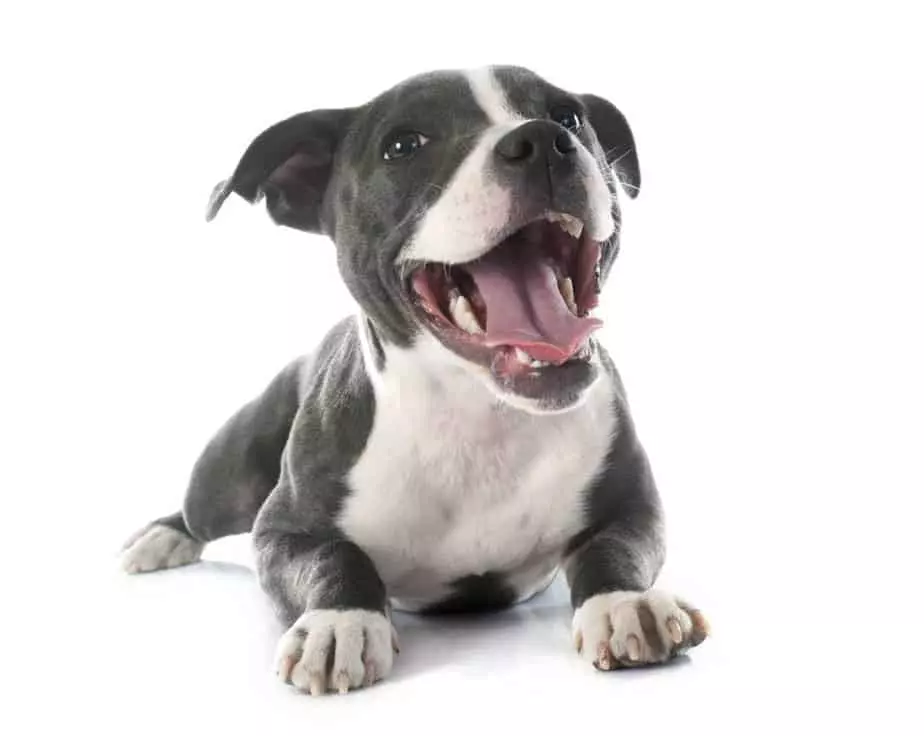
My puppy’s teeth are yellow
If your dog teeth are turning a very yellow color and no longer a pretty white color, this can be due to medication or a disease that they had as a puppy.
Doxycycline and certain other medications will damage the enamel on your puppy’s teeth. Sometimes, these medications must be given if your dog is very sick as a puppy. Most vets will try other medications beforehand because of the color that they will turn your dog’s teeth.
Distemper is a virus that many puppies are vaccinated for. This is a highly contagious and often fatal disease. A side effect of a dog having the distemper virus is discolored teeth. Many of these dogs will have a yellow to brownish tent on their teeth. This virus inhibits normal enamel development causing this discoloration.
Can puppies have rotten teeth?
Yes, your puppy can have rotten teeth. However, this is very rare as only about 10% of dental issues seen in dogs are due to a rotten tooth. Puppy teeth usually fall out before they become infected and rotten. Most commonly, periodontal disease, excessive tartar build-up, and fractured teeth cause most of the dental issues that vets see.
If your puppy does have a rotten tooth, it will need to be extracted by your veterinarian. If this tooth is also very infected, your puppy will need to be on medication to help treat this infection.
How to prevent discolored teeth in my dog
Most rotten and discolored teeth are caused by years of neglected dental care. One great way to help prevent rotten and infected teeth is to brush your puppy’s teeth every day. Starting your puppy off learning to tolerate having their teeth brushed will help keep your dog’s teeth pretty and white for their whole life.
Just like with people, it’s best to brush your dog’s teeth every day. While this may not always be feasible, brushing at least a few times a week will help.
One other great way to help prevent tartar and plaque buildup on your dog’s teeth is by giving them dental chew sticks and other dental toys to chew on.
The chewing action will act like a toothbrush and help remove any plaque and tartar buildup.
Your vet is another great source of information to help keep your dog’s teeth healthy. They can help check your dog’s teeth for any signs of infection and give you recommendations.
When should I worry about my puppy’s teeth?
Many dogs will lose their puppy teeth without any issues. Smaller-bred dogs such as Yorkies and chihuahuas will never lose their baby teeth. If your puppy never loses their baby teeth, they will need these extracted by your vet. Many times, your vet will extract these baby teeth when your dog is spayed or neutered.
If you do not have these teeth removed, your dog can develop plaque or tartar around the gum line and between these teeth and their adult replacement. This can cause periodontal disease and infection along their gum line.
Another issue with not removing baby teeth is overcrowding. As the baby teeth fall out new, adult teeth come in. If your puppy never loses their baby teeth, these adult teeth come in where they can find room. This can lead to overcrowding and crooked teeth. This will eventually cause other dental issues.
What happens when my puppy’s tooth falls out?
Many times, your puppy’s tooth root will die, and the roots will be absorbed by the body. When this happens, it makes the tooth hollow.
Since the roots are gone, there is nothing to hold the tooth in the socket. These teeth will become very wiggly. As your dog starts to chew their food or on a toy, they will fall out.
You may find one of these little teeth on the floor or in their toys. Do not be alarmed if you never find these teeth. Many puppies will swallow these teeth. It will not cause any health issues if your puppy swallows their teeth. They will quickly and easily pass in their stool.
When will my puppy start to lose teeth?
Your puppy will start to lose their front two teeth starting at 3 months of age. Each month the next one will fall out. Your puppy will lose their canine teeth at 6 months of age. All their puppy’s teeth will be gone by 8 months of age. After this, you should only see your puppy’s adult teeth.
Final Thoughts
If your puppy’s tooth is discolored, this is most likely a normal process of the tooth losing blood supply, dying, and getting ready to fall out. If your dog is not losing teeth as they should, or you see discoloration on an adult tooth, it would be best to see your vet.
Your vet can examine your dog’s teeth to check the coloring or if there is something that needs to be addressed to help your dog’s teeth stay healthy and happy.
Starting preventative maintenance on your puppy’s teeth at an early age will help train your dogs to tolerate having their teeth brushed as well as keep their teeth healthy and happy for as long as possible.

